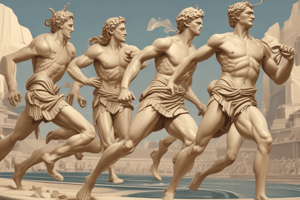Podcast
Questions and Answers
¿Qué tipo de preparación consideraba Jenofonte eficaz para la guerra?
¿Qué tipo de preparación consideraba Jenofonte eficaz para la guerra?
- Recitación de poesía
- Estudio de filosofía
- Meditación
- Práctica del atletismo (correct)
Según Platón, ¿qué dos facetas debe tener la educación?
Según Platón, ¿qué dos facetas debe tener la educación?
- Gimnasia y música (correct)
- Ciencia y arte
- Música y lengua
- Gimnasia y matemáticas
¿Qué opinaba Platón sobre el espíritu competitivo en el deporte?
¿Qué opinaba Platón sobre el espíritu competitivo en el deporte?
- Era el objetivo principal
- Debía ser rechazado (correct)
- Era necesario en todos los deportes
- No tenía importancia
¿Qué actividades consideraba Aristóteles esenciales para asegurar la salud?
¿Qué actividades consideraba Aristóteles esenciales para asegurar la salud?
¿Con qué frecuencia se celebraban los Juegos Olímpicos?
¿Con qué frecuencia se celebraban los Juegos Olímpicos?
¿Quién es considerado el dios que representó la institución de los Juegos Olímpicos?
¿Quién es considerado el dios que representó la institución de los Juegos Olímpicos?
¿Qué sanción podía recibir una mujer que asistía a los Juegos Olímpicos?
¿Qué sanción podía recibir una mujer que asistía a los Juegos Olímpicos?
¿Cuál era la principal misión de las mujeres libres en Esparta?
¿Cuál era la principal misión de las mujeres libres en Esparta?
¿Qué pensaba Isócrates sobre el tiempo dedicado a la educación física?
¿Qué pensaba Isócrates sobre el tiempo dedicado a la educación física?
¿Cuál fue la finalidad inicial de los Juegos Olímpicos, según la tradición?
¿Cuál fue la finalidad inicial de los Juegos Olímpicos, según la tradición?
Flashcards
First Row Items
First Row Items
Items numbered from 1 to 4.
Second Row Items
Second Row Items
Items numbered from 5 to 8.
Third Row Items
Third Row Items
Items numbered from 9 to 12.
Fourth Row Items
Fourth Row Items
Signup and view all the flashcards
Fifth Row Items
Fifth Row Items
Signup and view all the flashcards
Sixth Row Items
Sixth Row Items
Signup and view all the flashcards
Seventh Row Items
Seventh Row Items
Signup and view all the flashcards
Eighth Row Items
Eighth Row Items
Signup and view all the flashcards
Ninth Row Items
Ninth Row Items
Signup and view all the flashcards
Tenth Row Items
Tenth Row Items
Signup and view all the flashcards
Study Notes
- Xenophon considered athletic practice to be an effective form of preparation for war.
- Plato believed that education should consist of gymnastics and music.
- Plato thought the competitive spirit in sports should be rejected.
- Aristotle considered gymnastics and physical exercise to be essential activities for ensuring health.
- The Olympic Games were celebrated every four years.
- Zeus is considered the god who represented the institution of the Olympic Games.
- A woman attending the Olympic Games could receive the penalty of death.
- The main mission of free women in Sparta was to procreate.
- Isocrates thought that time dedicated to physical education should be balanced with intellectual culture.
- According to tradition, the initial purpose of the Olympic Games was fertility rituals.
Studying That Suits You
Use AI to generate personalized quizzes and flashcards to suit your learning preferences.





